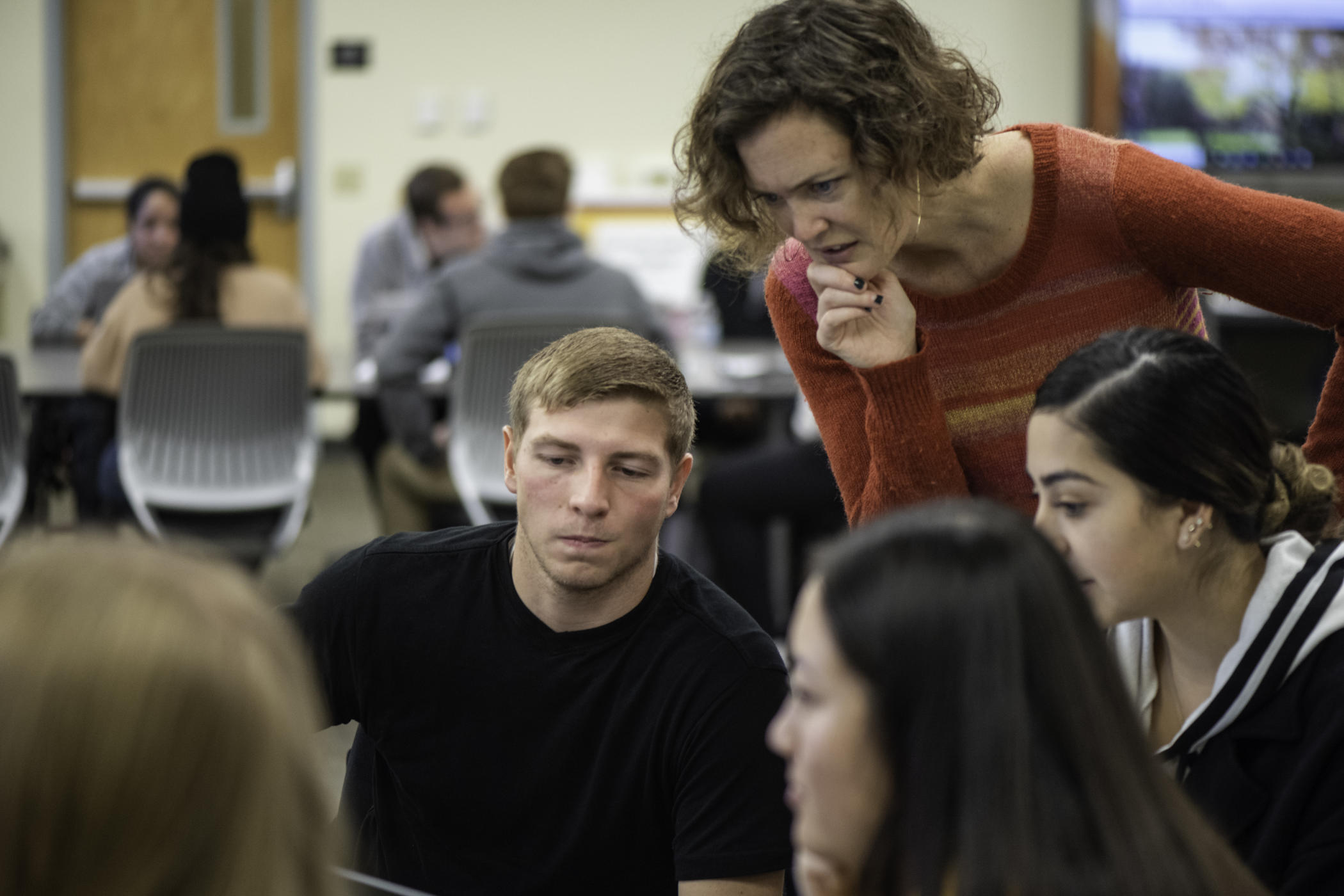Supporting Students Past the Tipping Point

Jennifer Wilking (right) speaks to Ryan Elkins (left) and students that work on research informs policy to Alleviate Housing Insecurity at the local level in a multidisciplinary courses, Capstone in Psychology (PSYC 401), Intro to Research Methods (POLS 331), Soc Welfare Policy/Progs/Svcs (SWRK 485), on Thursday, December 5, 2019 in Chico, Calif. (Jason Halley/University Photographer/CSU, Chico)
Hundreds of faculty and staff members came together the week before spring semester classes, with a singular mission: Let’s do better to ensure student success. A day focused on critical make-or-break moments—or tipping points—in students’ university experiences, the annual Tipping Point Student Success Summit featured our own campus experts sharing best practices with their peers to ensure students achieve their educational dreams and emphasize the values expressed in the University’s strategic priorities of equity, engagement, and resilience.
Here, we share a few takeaways and advice for faculty and staff gleaned from seven of the 12 Tipping Point sessions.
Eat, Sleep, Thrive: Meeting Basic Needs
When students adequately meet their basic needs, like food and shelter, their chances for success improve dramatically. Similarly, when students fail go without those basics, data indicates that their grades and health suffer. Be brave to ask the difficult questions to see if students would benefit from our on-campus services, like the Hungry Wildcat Food Pantry, short-term housing, or emergency loans and grants.
“Professionalism” as a Barrier to Student Success
The word “professionalism” can mean different things to different people and different cultures. Instead of judging students by our own definition of how someone “should” dress or act to be “professional,” we should focus on their talents and education, listen to them, be intentional about welcoming them, and guide them along a path that will maximize their success.
Clash of Cultures
As our campus grows more diverse, we are exposed to new ways of thinking. Encouraging students to discuss perspectives and life experiences that may be unfamiliar is an important part of building strong minds. A few keys to having open and constructive discussions about difference:
- Practice authentic and empathic listening to avoid polarization.
- Think critically by focusing on data and reason, rather than criticizing the person you’re engaging with.
- Promote respectful opposition and continued dialog.
- Encourage cooperation by being collaborative.
- If needed, agree to disagree to avoid an impasse.
Deconstructing Student Academic Experiences
National studies show that US college students who face challenging opportunity gaps like poverty, limited access to healthcare, and language barriers (to name a few) are also more likely to face gaps in academic achievement. We can better support our students in the classroom by establishing clear course goals and requirements, ensuring classroom sessions are thoughtfully organized to maximize learning, and providing examples and illustrations to explain difficult topics. Early feedback on students’ drafts or works in progress, as well as prompt and detailed feedback on tests and completed assignments, is also beneficial.
Come Together: Strategies for Equity and Inclusion
College students with disabilities face greater barriers to success than their peers, including lower employment after college, greater risk of mental health issues, and high rates of suicide. About 25 percent feel like they are not a part of campus. With 5 percent of students at Chico State identifying as students with disabilities, we should strive to explore our unconscious bias, review our policies and procedures, understand the differences in needs of students with disabilities, and know where to ask for support. We also can embrace universal design and proactively work toward equitable learning environments instead of putting the burden on students themselves.
The Four Ps of Learning and Engagement
By considering place, purpose, participation, and public engagement, we create better learning environments for everyone. It’s key to understand that where students come from and where they are now can directly impact their educational experience. We also want to ensure students understand the true purpose of a lesson and shift toward a social perspective on learning that rewards participation. Lastly, we can strive to consider how we can incorporate a public event into our course, such as flu clinics for nursing students and the Chico Great Debate for communication students.
Mindfulness Meditation
We never get a break—and neither do our minds. As we rush from task to task, our minds are always on the past and the future, instead of the present. We struggle to focus, and our performance suffers the consequences—for students, this includes their academic performance. We can model the importance of taking time to pause and quiet our minds. Consider starting your class, event, or meeting with even just one minute of mindfulness like taking a few deep breaths or sitting in silence to build better resiliency among our entire campus community.


